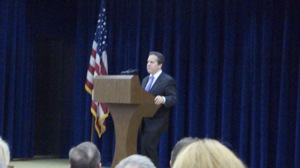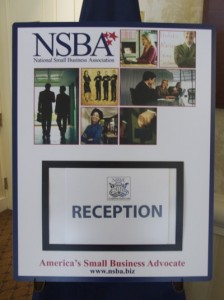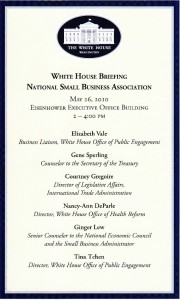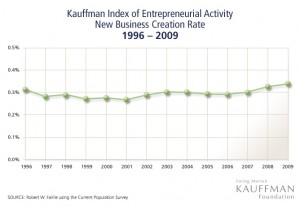Reform of our patent process could help stimulate innovation and entrepreneurial activity by offering more cost-effective means of protecting intellectual property. But despite bipartisan support, the Senate reform bill has not made it to the floor for a vote. The stakes are high; patents are often critical to securing venture capital funding and without protection of their intellectual property, entrepreneurs are often reluctant to undertake risky investment in commercializing their innovations. At our recent small business briefing in Washington DC, members of the National Small Business Association told White House officials that at least six years pass from the time of filing for patent protection to the first office action and hundreds of thousands of dollars in legal expenses are incurred in the process. The backlog of applications to the U.S. Patent and Trade Office exceeds 700,000. Other countries offer clearer, more transparent processes, such as a first to file system. The United States is the only major developed country to award patents to those who can prove that they invented something before someone else filed a patent on it. As a result, our system is mired in costly litigation to resolve needless disputes. The reform bill would transition the U.S. to a first to file system and would reduce by one-half filing fees for smaller businesses. Let’s make our voices heard by our Senators and Congressmen that patent reform is a top priority for the small business community.
Archive for the ‘Entrepreneurship’ Category
Time to Fix Our Patent System
Thursday, June 24th, 2010Plus Ça Change
Thursday, June 24th, 2010Waste and abuse that was tolerated in the boom economy is now coming under long overdue scrutiny. The Associated Press reports that New York State is preparing to junk the Empire Zone program, which was ostensibly to help businesses create jobs and expand the tax base in under-served communities. In fact, it was nothing more than welfare for politically connected large corporations. The independent Citizens Budget Commission found that most companies failed to deliver the promised jobs in exchange for substantial tax breaks awarded by the Empire Zone program. Companies that failed to meet the targets for job creation or their own investment include major Fortune 500 companies, such as Coca-Cola and Target. But before we break out the champagne and celebrate, let’s ask two questions: first, does New York State intend to demand a refund of the tax credits improperly used by close to 5,000 companies in the Empire program? Second, does New York really believe that the Excelsior Program, which it is touting as the success to Empire, will be any less prone to corruption and abuse?
Words of Inspiration
Tuesday, June 22nd, 2010Jeff Bezos, the CEO of Amazon, delivered the commencement address at Princeton University and his words should resonate with every entrepreneur, as they inspire the graduates:
“After much consideration, I took the less safe path to follow my passion, and I’m proud of that choice.
Tomorrow, in a very real sense, your life — the life you author from scratch on your own — begins.
How will you use your gifts? What choices will you make?
Will inertia be your guide, or will you follow your passions?
Will you follow dogma, or will you be original?
Will you choose a life of ease, or a life of service and adventure?
Will you wilt under criticism, or will you follow your convictions?
Will you bluff it out when you’re wrong, or will you apologize?
Will you guard your heart against rejection, or will you act when you fall in love?
Will you play it safe, or will you be a little bit swashbuckling?
When it’s tough, will you give up, or will you be relentless?
Will you be a cynic, or will you be a builder?
Will you be clever at the expense of others, or will you be kind?
I will hazard a prediction. When you are 80 years old, and in a quiet moment of reflection narrating for only yourself the most personal version of your life story, the telling that will be most compact and meaningful will be the series of choices you have made. In the end, we are our choices. Build yourself a great story. Thank you and good luck!”
State Contracting Becomes Riskier
Wednesday, June 16th, 2010The states face budget shortfalls in excess of $100 billion and are coming up with creative ways to conceal their problems, including stiffing vendors. The Wall Street Journal reports that New York State has been unable to pay approximately 30,000 agencies with which it contracts for social services. State agencies are quietly asking the contractors to continue to provide services without any assurances that the government will pay them or when any payment could be expected. Typically, New York uses emergency appropriations, called extender bills, when it cannot reach a budget agreement between the Governor and the State Legislature. This may be the first time that funding for such social services has not been included in the extender bill. The Governor warns that chaos may result if a budget is not passed this week. But it is not just social service agencies that are suffering; construction companies report that New York State is also in arrears in paying them, as well, and they have been quietly asked to continue to work without pay. Given that nearly all of the states are facing varying degrees of fiscal strain, New York’s experience is not likely to be unique. Small businesses that have the state government as a client face an awful choice: do you continue to provide services, if you have a sufficient reserve of working capital to do so, in the hope your loyalty will be rewarded later? Or do you cut your losses and deem the government an undesirable client?
Breakfast with Congress
Tuesday, June 15th, 2010
One of the highlights of the National Small Business Association presentation in Washington DC was the Congressional Breakfast, held this year in the Senate Caucus Room where Senators and Congressmen addressed key small business issues and answered questions from NSBA members. Senator Landrieu (D-LA) secured the facilities for the Congressional breakfast, but unfortunately was unable to attend, owing to last-minute emergencies related to the oil spill. Her staff represented her at the breakfast. Rep. Niki Tsongas (D-MA) spoke on the Small Business Innovation and Research program. Rep. Peter Welch (D-Vt.) spoke on small business credit card issues. Sen. Scott Brown (R-MA) and Rep. Nita Lowey (D-NY) spoke separately on the small business legislation initiatives currently moving through the Senate. Sen. Kit Bond (R-MO) urged the NSBA delegates to engage with their representatives in Congress to raise awareness of small business issues. Rep. Edward Markey (D-MA) closed the breakfast with remarks in support of small business credit card reform and preservation of the SBIR program. We should all reach out to our representatives in Congress to make our voices heard. The viability of the small business sector is critical to our economic recovery, so we have visibility now.
Small Business is Too Big to Fail
Saturday, June 12th, 2010The National Small Business Association published “Squandered Opportunities and Misplaced Priorities: Why Small Business is Too Big to Fail”, a report chronicling certain of the largest opportunities Congress and the administration missed in addressing the biggest challenges facing U.S. small businesses.
“There are more than 70 million people in the U.S. who work for, or run a small business – one-third of the voting population in the U.S.,” stated NSBA President Todd McCracken. “Despite that number, and the increased public profile of small business, not enough has been done to actually help small businesses survive the economic downturn.”
NSBA’s campaign, “Small Business: 70 Million Strong…And Voting” educates lawmakers, candidates and the public on the importance of small business to the U.S. economy. In the two years since the campaign was launched, the U.S. economy has plunged into recession, resulting in a new (at least in word, if not deed) recognition of the importance of small businesses to job creation. But speeches have not led to constructive policy.
“Squandered Opportunities and Misplaced Priorities” highlights Washington’s most disappointing failures, including the failure to enact long-term reauthorization of the Small Business Innovation and Research Program, the exclusion of small business credit card accounts from the protections afforded by the CARD legislation; failure to correct the distorted incentives of the estate tax and the failure to ensure fair labor law processes. The report compares the cost of addressing these key small business priorities to the cost of other initiatives of the administration, such as the Troubled Asset Relief Program (TARP) and health-care reform legislation. The cost differential is staggering: $2.9 trillion spent on major initiatives vs. $358 billion, the estimated cost of small business programs called for in pending legislation.
“Despite our very-well earned frustration at these many missteps, NSBA’s small-business members still believe there is a way forward,” stated NSBA Chair Keith Ashmus and co-founding partner at Frantz Ward, LLP in Cleveland, Ohio. “However, more can and must be done—small business will no longer accept rhetoric in the place of action.”
Sign of the Times: Investing for the Future
Thursday, June 10th, 2010FedEx Office released the findings of its third annual Sign of the Times national small business survey. The study, conducted in April, finds that small business owners are more optimistic now relative to their views last year at this time. They look forward to leading the U.S. out of its protracted recession, as 72% expect to be the driving force of the economic recovery in 2010. Half of those surveyed stated that their businesses have recovered or will fully recover by year-end. Perhaps these findings should be taken with a pinch of salt, as the survey was conducted before the Gulf Coast oil spill changed the outlook for our energy markets. Nevertheless, other findings of the survey continue to resonate. About 42% of small business owners are considering increasing spending on marketing and advertising initiatives this year and 30% may increase spending on sales programs. It is encouraging to read that small businesses see the opportunity for growth in the recession; perhaps opportunities that were previously out of reach have now become affordable. That is certainly my experience. To read the full FedEx Sign of the Times survey and learn of the sentiment of your peers in the small business community, click here.
Measuring Performance Is Not Straightforward
Monday, June 7th, 2010This weekend, I read an excellent article, “The Expectations Treadmill”, in the current issue of the McKinsey Quarterly. This publication is obviously not geared towards small business owners, which is why I appreciate its insights – I like to learn about best practices from leading corporations that I can apply to my own business. And occasionally, it lifts my spirits to be reminded that whatever challenges we face in the small business community – such as the inability to diversify risk and the lack of access to capital – the alternative of large corporate employment remains unattractive for a number of reasons. McKinsey’s article sheds light on one of them: the difficulties of measuring management performance. I appreciated the counter-intuitive insight that the share price measure complicates fair compensation for managers of public companies. We tend to think it is harder to value privately-held concerns, that the public companies have an indisputable report card in the form of share price at the close of each business day. Many believe that total return to shareholders, meaning share price appreciation plus dividends, is the cleanest measure of performance. McKinsey’s analysis highlights one of the deficiencies of this measure: share price embeds market expectations about future performance. As a consequence, measuring performance by total shareholder return distorts incentives, leads to bad decisions and alienates capable managers. One aspect of private company ownership/entrepreneurship that I truly appreciate is that I am not hostage to the expectations of the stock market or a focus on short-term returns. At a time when we are all gloomy about access to capital and other hardships we face as small business owners, it is good to be reminded of our advantages.
White House Briefing for Small Businesses
Saturday, May 29th, 2010This weekend concludes National Small Business Week, a tradition that began with President John F. Kennedy in 1963. I had the pleasure of spending part of the week in Washington DC, participating in events organized by the National Small Business Association, which recognized me as one of five finalists for the honor of small business advocate of the year. The White House organized a policy briefing for us; I have attached the agenda in the image graphic. For me the highlight of the briefing was the presentation by Gene Sperling, Counselor to the Secretary of the Treasury. He highlighted the four components of the Administration’s small business legislation package that he expects Congress to pass by the Fourth of July. He shared two concerns about the state of small businesses that particularly resonated with me. First, the National Federation of Independent Business publishes an index of small business optimism, reflecting the expectations and views business owners have about the state of the economy. We also have a “CEO Outlook” index, the Fortune-500 equivalent, that captures the big business view of the economy. These two indices should be the same, reflecting the same economy, but in fact there is a wide divergence in views and expectations. Small business and big business are having completely unrelated experiences in our current market which conditions their hopes for the future. The second, and related point, concerns the contraction in bank credit. Large corporations finance only 30% of their capital needs through banks; the comparable figure for small businesses is 90%. So when banks contract their lending, small businesses are more severely impacted. In future blog postings, I will write in greater detail about the issues discussed at this policy briefing and invite your comments. I will tell you that it was 99 degrees outside when we were in Washington DC and despite the stifling heat and humidity, I am very glad that I participated. We had a number of events for several hundred small business owners across the country to come together and work on policy issues of common concern. As difficult as the economy is right now, it is truly inspiring to be engaged in the small business community.
Record Business Start-ups in 2009
Monday, May 24th, 2010The Kauffman Foundation reports that in 2009, U.S. new business formations reached the highest level in 14 years, even exceeding the number of startups during the peak 1999 – 2000 technology boom. In 2009, the third year of the deepest recession since the Great Depression, 100,000 Americans started businesses each month, representing a 4% increase over 2008. The Kauffman Index of Entrepreneurial Activity also finds that African Americans and older Americans were the two demographic groups with the greatest increases in business creation rates year over year. Is this trend something to celebrate? The Kauffman Foundation seems to think so, but remember, most small businesses will fail and fewer than one in five survive to reach its fifth anniversary. The trend may represent an attempt to create self-employment from those who have been laid off and are discouraged in the job market. These new entrepreneurs are taking on significant risk, such as putting equity in a business, purchasing equipment and services and possibly guaranteeing debt for a business that might not succeed. Of course, that is always the risk in entrepreneurship, but older Americans do not have a long time horizon to play catch-up on retirement savings when a business fails. Let’s reserve judgment until 2014 when we see how the Entrepreneurial Class of 2009 fares on its fifth anniversary. To see the entire study of the Kauffman Foundation, click here.







